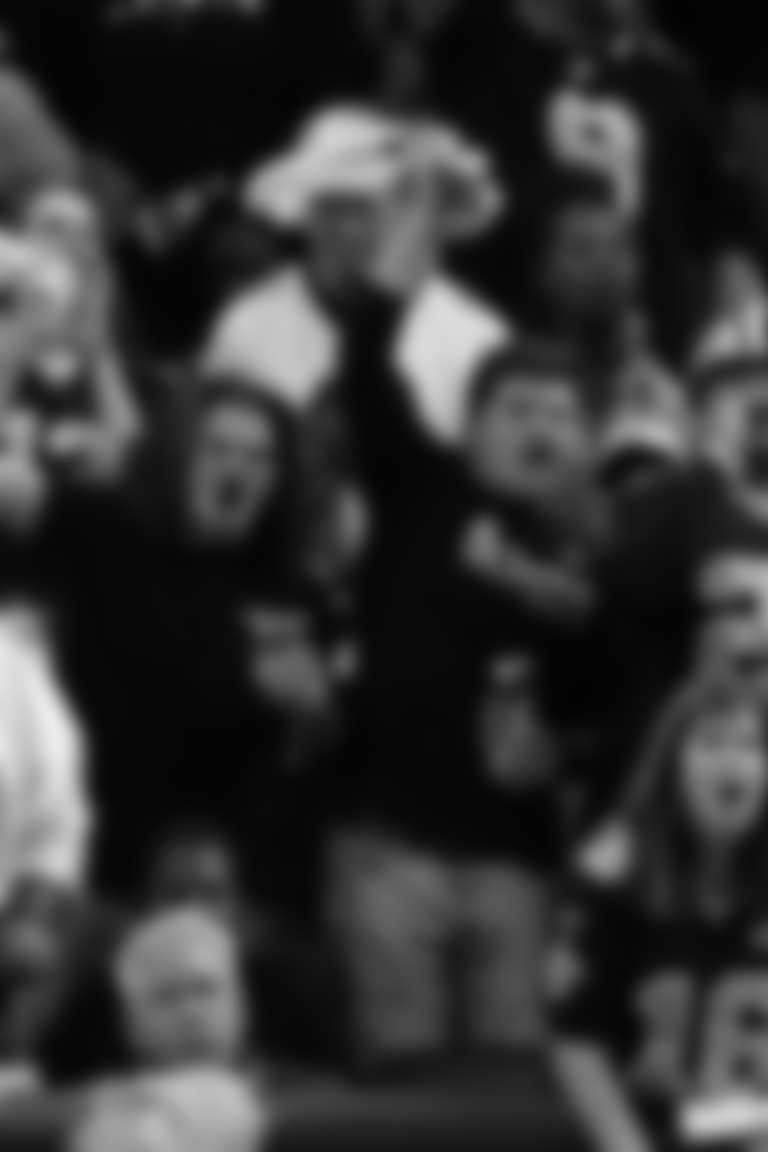New Orleans Saints Executive Vice President/General Manager Mickey Loomis
2021 NFL Pre-Draft Media Availability
Wednesday, April 28, 2021
I know every draft is important. But is there a different sense of urgency with this one, just with the needs that this team has?
"No, I don't think that's the case. It feels pretty normal. Obviously, the process is a little different than it has been in most years. But yeah, I don't think, we always feel urgency with the draft and opportunity to, you know, improve our team. But I don't feel like it's any different with regard to how important it is."
Are there any positions specifically that you feel are strengths in this draft and does your approach change having eight total selections this year?
"I don't think the approach is different. Obviously the results in terms of what we add to our team are different. But look we're happy to have the amount of picks that we have this year. When you don't have a lot of picks sometimes it feels like you've done all this work, and don't have much to show for it. So it's good to have more picks. In terms of strength in the draft, I think, you know, really the only thing I'd say is I think it feels a little more, it feels stronger offensively than defensively is probably the best way to put it."
I know Sean Payton recently said, he feels like cornerback is a priority, obviously, for you guys to address now whether that's in the draft or free agency, we'll see. But do you feel like at pick number 28 if you wait in there and say you wanted to select a corner that you could?
"Yeah, I think it's good question. Yeah, look, I think there's going to be good players, I think there's going to be guys that can come in and help our team at that position as well as others. And yet, I also would say no different than most years, is that you really want to, when you're down particularly in the back half of the draft, you want to be able to take the best player available and sometimes that's a glaring card that sits on your board above all others, and it may, in fact, most of the time, it's not at the position that you might prefer."
Sean Payton said earlier in the week that quarterback was not a must position, but where do you fall just on the status of the quarterback room and what's available in the draft?
"Yeah, look, No. 1, I love our quarterback room. We had great experience with Jameis (Winston). We all are excited about Taysom (Hill) and his opportunity. Yeah, in terms of this year, look, this is a good group of quarterbacks and I think it's going to be evident tomorrow night by the number of guys that are taken and then there's some guys down the line, I think that that have an opportunity to end up being good players. So, we'll just see how it shakes out. But the answer to your question is that we do like our quarterback room."
Would you say it's safe to say or fair to say that you guys are just an aggressive team when it comes to the draft?
"Well, if aggressive means move up, as opposed to move down, yeah, I guess that's what our track record is. Look, one thing that I think we've done in the past is we've found somebody that we love and we've oftentimes made moves to go get that player or players and so if that's the definition of aggressive then I like it."
How would you describe Jeff Ireland's role in in what your front office has built these last couple of years?
"Yeah, look, Jeff's an important part of our personnel department. He is important part of the decision making process that we have here, as well as the information gathering process and he's done a fantastic job along with, you know, all of the guys in the scouting department. You know, we've got three national scouts and Mike Baugh and Terry Wooden and Cody Rager and some great area scouts and look these guys don't receive enough credit for particularly the players that we end up with down the line. Sometimes the draft isn't necessarily just what you do in the first and second round. It's what you do later and in free agency, with these undrafted free agents and I think one of the things I am really proud of and proud of our personnel department for is our track record on undrafted free agents. And look, almost all the credit goes to those guys."
Has Jeff Ireland brought in a process that has help in that regard?
"Yeah, absolutely. Absolutely, look Jeff has done a great job of taking our process, taking the things that we've done here and adding to them. And they're not just his ideas, they're their ideas that he gets from all the guys in his department and guys that have been here, Terry Fontenot, and Michael Parenton, who's now our pro personnel director, as well as some other guys in our department. And look, we always ask anyone who comes in from another team, whether it's a coach or scout. We ask them about the process they've been accustomed to and we're always looking to add ideas and we don't mind stealing them from other teams."
Can you share what you have decided to do on Marcus Davenport's fifth-year option?
"We'll make an announcement on that, obviously, before the deadline, but I'd rather not use this forum to do that."
Does the fact that you guys have maybe a few more roster holes than usual this time of year and really just a total number of players to fill out the 90-man roster? Does that a make you want to keep X number of picks?
"Yeah, I probably look a little differently. I don't see a lot of holes in our roster. I mean, obviously, you know, we've got the ability to sign up to 90 players, but in terms of our roster, look, I think it's hard to make our team. I think we have a lot of talent and a lot of positions and when you look at each of these position groups. A lot of times it's hard to envision, a rookie coming in and displacing some of our veterans. So I wouldn't say that volume is a priority for us. I think quality is a priority for us."
How different has it been getting medical information this year? And if that is different, is the information been good enough that you can trust it to make decisions the same way you did before?
"Well, it's not as good as it's been, even last year, because we did have the combine. The combine is an important event for us. You know, with the clubs, we get the bulk of our medical information out of that combine. These players are given a lot of physicals, they get MRIs, they get images, they get questioned multiple times and look we benefit from that it's been much more difficult and that burden has fallen on our trainers and doctors and look, I think the process probably has been as good as it can be. And yet I wouldn't say it's as good as it's been."
A year later, what can you say about last year's draft? And are there any players in this draft who have a lot of talent, but you're concerned about other things that you might red flag them no matter how talented they are?
"Yeah. Look, I think we're encouraged by some of the things that our guys did a year ago, and from that draft. Look, it's still too early just to make a judgment on it in total. But I would say we're encouraged by the guys that we took last year. Yeah, look, I would say with regard to your second question, there's always things that you get concerned about. There's some things, you know, with certain players that concern raises to the level of, we're probably not going to take this player. I think I'm answering that question that you asked. But yeah, there's certainly guys in that category, I'd say that, one of the things we are missing this year is we didn't have the opportunity to have face-to-face interviews, sit in the same room with guys, have guys come in and visit and spend extra time with them. And that's a really, really valuable part of the process. And I think sometimes, given that we did not have that opportunity this year, or really last year, for the most part, outside of the combine. I think, for us, we've discovered just how valuable that is and it makes for an incomplete picture a lot of times. And so, we have to, you know, just make our best judgment."
If you're judging a player, maybe two players that are equal, how much will it weigh on you, if one played last season, one opted out and hasn't played football in a long time or will it in any way at all?
"Yeah, I don't see that as being a significant variable. Obviously, it exists and the more current information that you have, obviously, the better it is. But, look I can't think of too many circumstances where it's going to negatively impact a player if he opted not to play last year. There's too many other variables that exist and too many other decision points that, you know, I don't think we'll ever get to...we'll ever get to a situation where there's two players completely equal. And that's the final variable. I just, that's hard for me to envision."
Do you see maybe more gamesmanship from teams with maybe newer front offices and staffs than maybe…You've been doing this now for two plus decades with the Saints, with Sean (Payton) for 15 years. And I know that, not to say that you have been telegraphing what you do, but in 2017, you said you needed to help your defense and you drafted (Marshon) Lattimore. Last year, Sean (Payton) said offensive line was a need, and you drafted (Cesar) Ruiz. Not that you're telegraphing what you do, but do you believe maybe in gamesmanship, you all have kind of moved past that at a certain point?
"Well, you know, I think this, I think that the farther back you are, the less that, you know, misinformation or misdirection comes into play. I think when you're picking up, you know, at the front end of the first round, then yeah, I think there's some misdirection that can be important. We just haven't, you know, had the opportunity to pick up that high and quick sometimes. So, there's less need for, you know, when you pick at 28, I mean, listen, it's hard to figure out who even might be there and available to you. So, there's not a lot of misdirection that's necessary."
Back to the opt outs, some guys didn't play at all, some guys played some games, some guys played as many games as they possibly could. How do you balance that some guys got 12 games, some didn't play any, some played three. And then FCS guys, some of them, you know, are playing right now, or were playing recently, just how does that?
"Well, there is no balance. It's not equal in terms of the amount of information you have on a given player. So, you just take what you have, and you make your best judgments. And, look, I have a lot of confidence in the guys, you know, in our organization that evaluate and that includes our coaches who do a good bit of evaluation. So, all of us collectively are going to come up with the Saints' opinion, based upon the information that we have. And look Amie (Just) you're right, there's just, that's the difference between this year and prior years, is in general, we just have less information. There's a number of guys in this draft that are going to be higher picks that have, you know, less than 10 starts in their college career and that's really unusual. The amount of guys that where that's the case and there's even more guys that just have one year of starting at the college level. So, it's just less information and we'll make our best judgment."
This is your first draft in a while without Drew Brees being your quarterback, I'm wondering, just does that affect you all in any way? Do you look for maybe receivers with a different skill set to the quarterbacks you have or offensive linemen in any way?
"Look, that is a good question, Jeff (Duncan). But, no, I would not say that has come into play. In fact, we've not talked about that at all in our draft preparation. We haven't, I can't recall a single time where it's come up, well, if Drew (would) have been here, we would have done this or now that he's not we need to, you know, that just hasn't been part of our process, you know, at all. It's a good question, though."
And following up, kind of dove-tailing off what Fletcher (Mackel) said, because there are so many new and younger general managers out there, are you finding them more conducive to trade talks? Is that something that's becoming more and more of a trend now, people open to making deals?
"I do feel like in the last few years, it feels like there's been more deals made. And I think there's been a lot of discussion that probably have gone...discussions that have gone further than maybe in the past, that even though they may not end up in trades. I don't know that that's, you know, connected to new GMs, or old GMs? Look, no one makes more deals than the Patriots. And we know Bill's (Belichick) been around for a long, long time. So, I don't really, as I sit here, I don't really feel like it's a lot different given the number of new general managers in the league. And look, a lot of these guys even though they're general managers, and sitting in that seat for the first time, they've got a lot of experience. George Paton and Chris Grier, and some of these guys that have gotten jobs have been part of the process for a long, long time. So, even though it feels like it's new to them, they're very experienced."
What's the adjustment process like for you guys from pick to pick and from round to round? Obviously, like you said, you're picking 28th. But you know, if something crazy happens at 27 or, you know, at the end of the first round, what do you guys do to regroup to reset your board and reevaluate on the fly?
"Yeah, look, I think all that is done ahead of time. I mean, we're still going to have, you know, no matter what happens in front of us, we've got pick 28. And we're going to have a board that reflects, you know, the number of picks that it takes, and then the guys that we like that it takes to select the player. When we pick, we have, you know, we have contingency plans, if, for example, you know, we have an expectation that there's going to be three or four guys at a particular area, and none of them are there, we have some contingency plans. So, you know, I can't recall a scenario that we haven't been prepared for over the years. So, I don't think this is going to be any different."
You had to be extremely creative this offseason in free agency have given the NFL salary cap changing. I know that there's players that you probably cut that you had a hard time with, but could you share with us like one player in particular that because of all the Covid stuff you had to cut or let loose that was really difficult? Maybe also just the process as a whole, what type of challenge that was for you as a GM that was so different than other years?
"Yeah, this was different, and look, it's always difficult to let somebody go out of your organization, players that have been contributors, and the longer they've been contributing, the more difficult it is. Thomas Morstead comes to mind immediately, how difficult it is to say goodbye to Thomas after everything that he's done and him being a draft pick that was criticized at the time we took him and for him to play so long and contribute so much to our team. But all of the guys that were contributors to our team, it's difficult to let those guys go. And it was different because of the nature of the salary cap. Look, it was a curveball that because of the pandemic, because of the things that happened a year ago that the salary cap was considerably less than what we expected. I give a lot of credit to Khai Harley, who was, listen, he's very talented in coming up with ways for us to create cap room in order to have as many guys on our team as possible, but it wasn't an easy process."
This might be too specific for you to answer before the draft, but I feel like you guys have had a prototype at linebacker where you've preferred bigger linebackers over the years and had kind of shied away from the more 220 pounders, almost hybrid safety guys, but then you made the trade for Kwon Alexander last year. Did that in any way reflect a shift in philosophy? Or did his fit in this defense change your mind maybe on a prototype at that position?
"Well, look, I think we're always looking for prototype, that's kind of been one of our underlying premises the entire time that I've been here. Particularly with Sean, it is we're looking for prototype, we're not looking for exceptions in general. And yet we know exceptions exist. Kwon's an example of a player who demonstrated his ability to play in the NFL even though maybe he's a little outside of our normal prototype. That's still our philosophy, but we also recognize that good football players can come in all shapes and sizes at times. We're pretty calculated when we go outside of that."
Did the FCS level players get any more exposure than they otherwise might have to NFL scouts, or at least your scouts because of when they played this year? And what do you think of the prospects from coming from that level in general?
"I think we've had some success with players at that level. So I wouldn't say it was a lot different. It's just that, again, it gets back right back to having current information and we had more information on the guys that played this last year in the normal timeframe. And yet, look, we're always looking. We spend a lot of time, our scouts do a great job of looking at FCS schools and looking at the players at that level. So again, I didn't feel like it was a lot different other than just having the amount of information."
Don't they have (schedule) conflicts, though, when they play at the same time as the major conferences and so forth? Whereas this year, there was only them during the spring?
"Yeah, look, I didn't feel that. When they play, look, it's convenient for us, for them to all be playing in the fall when football occurs. And again, the way we're structured, the way all teams are structured is we get to those schools. We have a good focus on all the players that are going to be draft eligible. So I didn't feel like that was a lot different."
You referenced the unpredictability of picking at 28, when you all evaluate guys I remember last year you said Zack Baun had like a late first or early second round grade, how close are some of those grades maybe between 20 and 40, or 25 and 50 for players you're evaluating? How close maybe is it for some of those guys?
"Yeah, I think it's, I don't know that I would say 25 to 50. But there's certainly a group of players and it is in that range that are pretty close. I think if you looked at five teams and that group of players, you'd have five significantly different orders within that 20 to 40, 20 to 50 range. So, yeah, that means that it is close and obviously it comes down to the eye of the beholder."
You mentioned your guys' aggressiveness in historically trading up and there are two schools of thought there. Obviously, some teams like to trade back and get a ton of picks, is your guys' approach a reflection of how much belief you have in your scouting? Is that kind of why it comes out in a more aggressive approach?
"Yeah, I think it probably comes from a couple things, but I think mainly is that we try to find a group of players that we really like, and we really believe will fit on our team, not just on a roster in terms of playing, but in terms of fitting in the locker room and the culture that exists here. And so you put targets on those guys. And look, when you have targets on players, we just believe you've got to go get them, you've got to go and be aggressive and not necessarily always let him fall to you. So yeah, that's the approach that we take."
Given that approach, do you guys have a smaller draft board overall than most teams would given the traits you're looking for?
"I don't know that because I don't see everyone's draft board. I think that, look, relatively speaking, based on my past experience, I would guess that our draft board is smaller than most, but I don't know that."
Because of the salary cap situation, and maybe because of the players you knew that you would kind of be forced to lose, I know you mentioned off the top here you kind of liked having all these draft picks more than previous seasons. Do you kind of slow play free agency like this year, knowing you can get some compensatory picks that you could earn down the line? Is that how you kind of play this type of offseason, knowing that it's a year of transition a little bit?
"I would say this, we definitely had our eye on compensatory issues. I think we did last year as well. And we definitely did this year. And yet, look, our participation in free agency is just directly a reflection of where we're at in terms of cap. I like participating in in free agency, I think that's a great avenue to improve your roster. And I think we've proven that in the past. it's not just at the top level, but it's at the mid-level. And look, we've prided ourselves on finding guys that were good value in free agency. Even at the expense of maybe forfeiting a later round compensatory pick. We just didn't have that luxury this year, given where we were at in terms of the cap, and look, I'm hopeful that that next year we'll be back and being a more aggressive player in free agency."



















